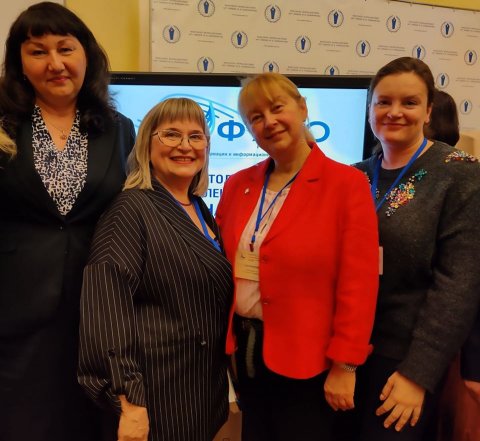The Faculty of Journalism of Lomonosov Moscow State University held the International Science-to-practice Conference on Journalism in 2019: Creativity, Profession, and Industry, which addresses modern issues of theory and practice of journalism. The SUSU Institute of Media, Social Sciences and Humanities was represented by Professor Lidiia Lobodenko, Director of IMSSH, Doctor of Sciences (Philology); by Liudmila Shesterkina, Head of the Department of Journalism, Advertising and Public Relations, Doctor of Sciences (Philology); and by Anna Krasavina, Associate Professor of the Department of Journalism, Advertising and Public Relations, Candidate of Sciences (Philology) at the conference.
Within the frameworks of the conference, the meeting of Student and Academic Services in the field of Journalism was held, where the representatives of the Ministry of Science and Higher Education of the Russian Federation, the Rector’s Office of Lomonosov Moscow State University, the members of FAMA Mass Media and Information and Library Management discussed the issues of switching to Federal State Educational Standard (FGOS) 3++ in journalism and to the practice of implementing Approximate Principal Educational Programme as part of educational programmes in universities. Liudmila Shesterkina took part in the discussion and spoke about the project-based learning in the Journalism programme and the specifics of organizing the conference of the European Journalism Training Association at SUSU in October of 2020. Anna Krasavina, Deputy Academic Advisor of the Laboratory, presented her report on International Research Laboratory of Virtual Reality at SUSU at the Perspective Approaches to Journalists Training section. She spoke about the creation of a new university laboratory and strategic direction of scientific research activities of the department in the field of virtual reality.
“Participation of the SUSU Institute of Media, Social Sciences and Humanities at international conferences is really important, since the issues and problems of the theory of mass media in the context of social practices transformation and mass media digitalization are being addressed there,” said Lidiia Lobodenko, Director of IMSSH. “We all live in the media world and have to constantly study, analyse and comprehend the laws of its development. The concept of “media”, that includes means of communications, information transfer methods, as well as the media space formed by them, is developing very rapidly, and so, it is necessary to acquire new knowledge about this process as quickly as possible in order to build the educational process and the scientific-research work in the field of social sciences and humanities knowledge at a high level in future.”




